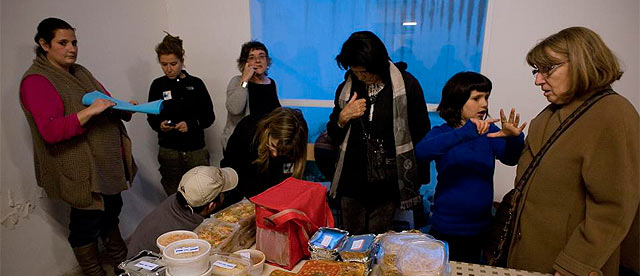«The crisis is that we don’t have a lot of money, we don’t have a lot of food, we ask my mother’s friends to give us clothes» (9 years old). «It affects me because every day I am sadder. It affects my family because every day they have more problems with the banks» (8 years). «They don’t buy me toys anymore, my parents argue because they don’t have money» (9 years). These are some examples of children talking about the crisis and its impact on their lives.
Their conscious and responsible words are linked to many events that, in recent months, are putting them at the center of social concerns. The last of these is the detection of a growing number of cases of families that have problems to adequately attend to the feeding of their children.
Even though it is serious and capable of mobilizing social awareness like few others, it is not an isolated event, but a symptom (still to be quantified in most cases) of the progressive impoverishment of households in Spain, with a special impact on families with children. According to the Red Cross, the main risk factor for the children it assisted in 2011 has been the lack of economic resources, at a considerable distance from other factors.
The most recent data on child poverty (2011) place us in 27.2% of children living in households below the poverty line in Spain, only ahead of Bulgaria and Romania in the European environment. In addition to the growth of more than three percentage points with respect to 2009, several indicators show that the crisis is occurring in children in a particularly serious way.
In 2010, those under 18 years of age were the age group with the highest poverty rate, surpassing those over 65 for the first time. The number of households with children in which none of the adults have a job growth between 2007 and 2012 by 169%, compared to 60% in households without children. And furthermore, their poverty is more intense and more critical. In summary: there are now more children below the poverty line (we are approaching 2,300,000), poorer and for longer. Without forgetting that the situation affects groups of children in a situation of special vulnerability more intensely, such as children with disabilities, gypsies or those of foreign origin.
Families with children sacrifice many things to maintain basic levels of well-being. But if employment, savings and benefits dry up, scholarships and grants dwindle and even family support ends, they find themselves in the situation of having to reduce your expenses in aspects as basic as food or, for example, give up your home. It is not just a problem of nutrition, it is a problem of resources and lack of support for homes with children. And it is also a problem of the public policy approach.
Only the protective capacity of a universal system, the result of a long-standing political consensus, as is the case with the pension system, manages to contain the risk of social exclusion in many older people. Childhood also requires a universal protection system, the result of a similar consensus, with a State vision in the medium and long term.
What must we protect at all costs? Even acknowledging the complexity they hide, these are simple things, based on needs and rights. They are necessary goals, red lines that no State should exceed and that can be summarized in five purposes that could well be the object of a political and citizen pact against child poverty. No boy or girl should be deprived of:
- Access to food and material elements necessary and adequate for their development.
- A decent home.
- Full and equal opportunity access to education.
- Access to quality healthcare under equal conditions.
- Adequate protection against disarmament or violence.
Political parties, administrations and society as a whole must accept this pact. We live in a country that is still renowned for the quality of parent-child relationships and for the strength of its family support networks, and yet (and perhaps because of this) has historically been characterized by a deficient investment in social policies aimed at families and children. Policies that in these times of crisis have shown their inconsistency and fragility.
For this reason, the commitment must begin by changing what was necessary to transform a long time ago: assume that child protection and development are everyone’s business, not just their families. And that the negative impacts on their well-being and their rights are not only an ethical or human rights problem, but also are and will be negative impacts on the economic and social well-being of all citizens.
The opportunity to start this path is now. The Government is currently preparing the National Action Plan for Social Inclusion 2013-2016 and has publicly committed to making child poverty a priority in this document. From various organizations and platforms we have proposed 32 measures for this Plan eventually linked to the focus of the recent European Commission Recommendation on ‘Investing in Children’.
Proposals made from the conviction that investment in childhood is an unavoidable bet at this time, and one of the best antidotes to this and future crises.
SOS Children’s Villages. Pedro Puig, President.
CERMI (Spanish Committee of Representatives of People with Disabilities). Pilar Villarino, Executive Director.
EAPN Spain (European Network to Combat Poverty and Social Exclusion). Carlos Susanas, President.
Gypsy Secretariat Foundation. Pedro Bridge, President.
Children’s Organizations Platform (POI). Carlos Martínez-Almeida, President.
Solidarity Project. Adolfo Lacuesta, President.
save the children. Alberto Soteres, Managing Director.
UNICEF Spanish Committee. Javier Martos, Executive Director.

